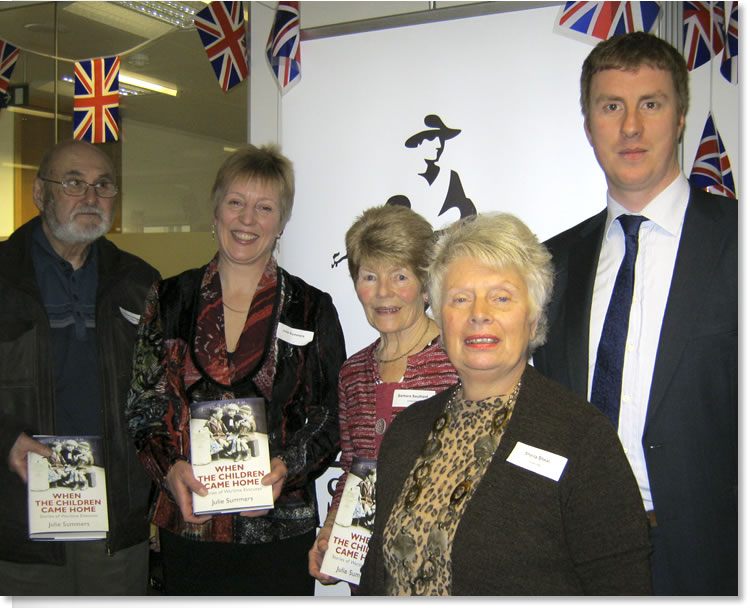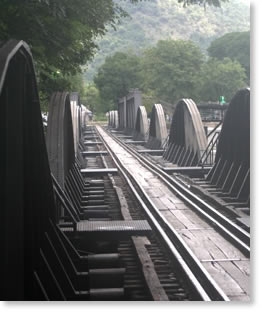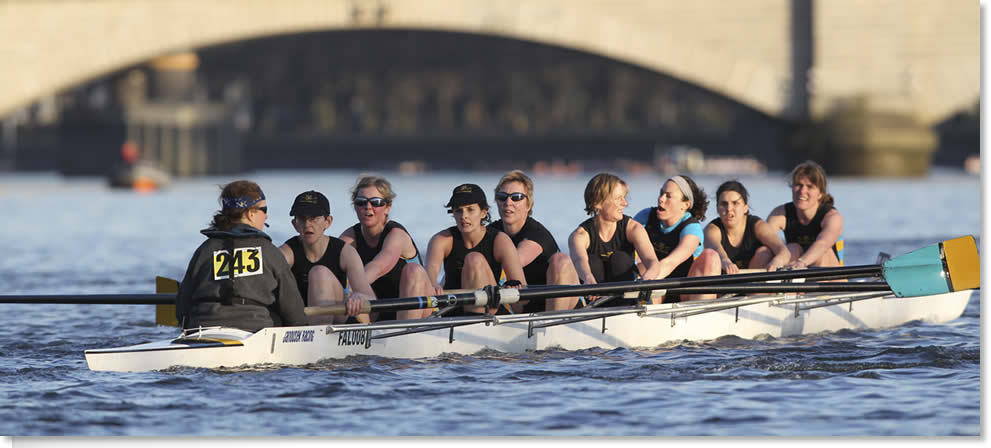Welcome to my seventh newsletter which I am writing on a glorious spring evening. The chickens are scratching around in the garden, ruining my borders to be sure, the birds are singing and the spires of Oxford are looking particularly dreamy.Contents
- The Evacuees are Launched
- A Play on Words
- Knowing Your Onions
- Pen Thoughts
- Forthcoming Events
 Norman Andrews (former evacuee), Barbara Southard, who appears on the front of the book with her arms around her little brother and sister, Sheila Shear (also a former evacuee) and Mike Jones, my editor at Simon & Schuster
Norman Andrews (former evacuee), Barbara Southard, who appears on the front of the book with her arms around her little brother and sister, Sheila Shear (also a former evacuee) and Mike Jones, my editor at Simon & Schuster

When The Children Came Home Launch

Joan Risley, her daughter, Julia Batchelor and her husband, Edward RisleyThe Evacuees are Launched
When the Children Came Home was launched at the offices of Simon & Schuster in London on 3rd March. The publicity and editorial teams really made the most tremendous effort on our behalf and it could not have been a happier occasion. I say on ‘our’ behalf because really it felt like more of a family party than a book launch. Twenty-nine people whose stories featured in the book came along, as did others who had been closely involved and we were treated to sandwiches, cake, tea and coffee in the boardroom which was decorated in Union Jack bunting. Prior to that, two of the ladies – Sheila Shear and Jessie Nagel – and I had appeared on Woman’s Hour just after Sarah Brown. I’m glad to say that Jenni Murray did not give us as hard a time as she did Mrs B.
The book has had a most wonderful reception, far exceeding my expectations, and was topped by a review in the Mail On Sunday on 20 March by Craig Brown which gave it five stars and made it Book of the Week. As this book has been such a wonderful collaborative project with the people who have been generous enough to share their stories with me, I like to think that each of them feels just a little bit of a 5* person at the moment. Radio 4 got in touch and asked if they could interview one of the evacuees from the book whose experience I had written up in the Guardian Family section. Gordon Abbott, whose good news story about his evacuation to Cornwall has touched many people, will be appearing on Saturday Live on Saturday 2nd April at 10am. I’ll certainly be listening in.
But do not let me get carried away and have you believe that I am getting too big for my boots. When I went on tour to the North West I was invited to give a talk at Waterstones in Chester, fifteen miles from where I grew up. There, on a rainy Tuesday evening, I gave my talk on the book to eight people plus the bookshop manager. Eight is bad enough, but I was related to three of them, my sister and two uncles. Not my most glorious moment, but certainly a reality check.
In my last newsletter I wrote of my hope that reviewers would pick up on the good stories in When the Children Came Home and not just focus on the one chapter that deals with abuse. I’m glad to say that so far my wish has been fulfilled. Interestingly, what is also coming out strongly is the sympathy people feel for the plight of the mothers, both those whose children left home and the foster parents who were bereft when the children returned to the cities. The fact that the evacuation was codenamed Operation Pied Piper has not gone unobserved. No mother came up with that name, for sure.A Play on Words
When I was up in Chester enjoying my celebrity status at Waterstones I chanced to meet a theatre director called John Gorman. He had been trying to get in touch with me for several months and we had always failed to connect for some reason or another. We finally met in the Grosvenor Hotel where he regaled me with his fantastic plans for a major arts festival on the Wirral this summer. It sounds quite extraordinary, with a poetry prom, music, a huge outdoor art exhibition and a series of new plays. When he came to share his ideas for the plays he leaned forward and told me with ever greater enthusiasm about a play he was planning to direct about my grandfather, based on The Colonel of Tamarkan. Bridge over the River KwaiI had an inkling that this was what he had wanted to talk to me about, as he had hinted as much in his earlier emails. I leaned forward too. This was fascinating stuff. A monologue examining the thoughts and feelings Toosey had when he was commanding those camps along the railway. It would explore the story of the Kwai from a completely different angle:the psychological. How thrilling. I sat back. ‘Who is writing the play?’ I asked. John replied. ‘You are’. I nearly spat my drink across the table. I am not often wrong-footed but this one caught me completely unawares. I spluttered and protested and said I couldn’t and so forth. ‘Oh, shut up!’ he said, impatiently, ‘of course you can do it.’ So I am. Doing it, that is. It is a colossal challenge and one I’m going to have to work incredibly hard at as I have never written any drama before. But I have long wanted to. Radio plays have always appealed to me and I have occasionally day-dreamed about finding the perfect subject for a Radio 4 afternoon slot. But it has never been more than just a day-dream.
Bridge over the River KwaiI had an inkling that this was what he had wanted to talk to me about, as he had hinted as much in his earlier emails. I leaned forward too. This was fascinating stuff. A monologue examining the thoughts and feelings Toosey had when he was commanding those camps along the railway. It would explore the story of the Kwai from a completely different angle:the psychological. How thrilling. I sat back. ‘Who is writing the play?’ I asked. John replied. ‘You are’. I nearly spat my drink across the table. I am not often wrong-footed but this one caught me completely unawares. I spluttered and protested and said I couldn’t and so forth. ‘Oh, shut up!’ he said, impatiently, ‘of course you can do it.’ So I am. Doing it, that is. It is a colossal challenge and one I’m going to have to work incredibly hard at as I have never written any drama before. But I have long wanted to. Radio plays have always appealed to me and I have occasionally day-dreamed about finding the perfect subject for a Radio 4 afternoon slot. But it has never been more than just a day-dream.
So I am now engaged in this wonderful project and finding it bewildering and terrifying as well as exhilarating and thrilling. I expect it will be ‘for one night only’ but so be it. I just hope that more than eight people turn out and that I do not find that I’m related to half of them.
I will be sharing my progress on the play with an audience at the Oxford Literary Festival next week. The event is sponsored by a whisky company, which has delighted Chris. I do the talk, he gets the whisky. No relatives are invited.

Knowing Your Onions
The WI book is proceeding apace and I am working, for the first time, with a researcher. I have never done this before, being terrified that if I employed someone to do research, they might miss the kind of details that I love to include in my books. However, I have no need to fear. I have found a man, Stephen, who really knows his onions. As I have been reading through Institute minute books I keep coming across references to the great onion shortage of the early 1940s. It was clearly something that bothered the government to the extent that the Ministry of Food asked the National Federation to urge local institutes to run an onion growing campaign. 25,000 onion sets were distributed to village institutes in 1942 but that year, certainly in the West Midlands, there was a bad attack of onion fly and whole crops were ruined.
Stephen and I discussed this onion problem and he went off and did a bit of digging around. He found that ‘Britain imported almost all of its onions from France and maybe Spain before 1939. Following the occupation of France this stopped, of course.’ Of course. Why hadn’t I worked that out for myself? He went on to explain that the other not so obvious problem is that onions do not grow very well in the UK. ‘The ones we grow today are largely the result of hybridisation, and known as short-day onions. That refers to the amount of daylight they require to grow. As any gardener will tell you, onions grow really slowly. The varieties available pre-war would not grow successfully in the UK – too cold, too wet, too dark in the early months of the year.’
The whole question of food imports is fascinating and I am going to need to devote quite a bit of time to working on this. According to press reports from October 1939, the twelve million eggs sent weekly to the UK from Holland were stopped, along with bacon and butter, the latter totalling 700 tons. No wonder there had to be rationing when that all ceased. Twelve million eggs. Some omelette, as Stephen observed. I thought you might also be interested to learn that the grouse shooting season in 1939 was a disaster with ‘even the best performers quite robbed of their normal skill: the state of Europe has shattered their powers of concentration.’ Oh woe that wretched war. The real Mont BlancPen Thoughts
The real Mont BlancPen Thoughts
My first idea about pen thoughts was to talk about an aspect of writing which would perhaps not occur to anyone not directly involved in producing books. But now I find myself compelled to write about what I really love, which is pens. I have a complete thing about them. I know exactly the weight in my hand of all my pens and I have certain pens to do certain things. For example, if I do the cross word, I just grab any old pen from the fifty or so in the jug on the side in the kitchen. But if I write a cheque then I like to do so with a fountain pen or a felt tip pen. The fountain pen I would use on those occasions would be a cheap Pilot disposable blue or black V-fountain pen. When I am writing a letter on beautiful paper (yes, that’s another of my weaknesses) I use my 10 year old Mont Blanc pen, which I bought when I finished Fearless on Everest. Occasionally it needs washing and cleaning out but by and large it has given very good service. It’s the slimline version of the Mont Blanc range. I don’t like the fat or thick-waisted version. It does not sit well in my hand and is too heavy. But my absolute favourite writing implement, above all others, is my Mont Blanc propelling pencil. It is slim, black, perfectly weighted, beautifully easy to use and lives in a very lovely red zipped pouch which I keep close to hand.
The striking thing about having a Mont Blanc pen fetish – and I acknowledge that it is terribly corny – is that it is an extremely easy chat up line. I was having a coffee in Oxford the other day and whipped out my propelling pencil to make a note of something in the black, leather-bound, cream- leaved A4 book I have kept for the WI project, only to be addressed by a Texan who was stuck, with his wife, in Oxford for two hours while they waited for their bus to take them on to Stratford. They were visiting Britain as part of a tour for her choir. I have a great affection for Texan men. One of my closest friends is married to one. So I chatted to this couple. Turns out he keeps a Mont Blanc (fat) fountain pen in the top pocket of his shirt whenever he is out on business. When he is wearing a jacket, he explained, he carries his Cross pen because that sat more snugly in his inside pocket. Well, we chatted on about pens for a bit, and then I suggested a quick two-hour itinerary of Oxford colleges for them. From Carfax down the hill to Christ Church then down Merton Street to Oriel, Corpus Christi and Merton itself (taking in the Sandy Irvine Memorial) and finally to Pens Plus on the High Street. We parted on the best of terms. Now, had I not been using my pencil that conversation might never have happened and I would not have been reminded of Ben, the lovely Texan husband of my friend Amanda. Falcon Rowing Club Women’s Eight rowing towards Barnes Bridge (and doing a spot of sightseeing en route) From bow: Ali, Anna, Emma, Caroline, Julie, Claire, Zena, Naomi and Lil (cox)
Falcon Rowing Club Women’s Eight rowing towards Barnes Bridge (and doing a spot of sightseeing en route) From bow: Ali, Anna, Emma, Caroline, Julie, Claire, Zena, Naomi and Lil (cox)
(Photo courtesy Iain Weir)Finally…
A few years ago Simon said to me that the only way I would ever really understand what it was like to row in the Boat Race, as Sandy Irvine had done, was to compete in an eight on the Tideway. In mid-March nine of us met up at Putney on a warm, sunny afternoon and rowed in the Women’s Head of the River Race. It was one of the most exhilarating and exhausting things I have ever done. 4 ½ miles of unrelenting pulling. I have more respect than ever I had before for those formidable crews who belt upstream from Putney to Mortlake for about 17 minutes. Downstream with the tide was hard enough. We finished a creditable 181st out of 300 crews, fully 60 places up on our start position.
Julie Summers
April 2011, Oxford
julie@juilesummers.co.ukForthcoming Events
- Sunday 3rd April 11:30am
Oxford Literary Festival: Highland Park Keynotes Readings in the Festival Marquee at Christ Church The Colonel of Tamarkan – the true story of the Bridge on the River Kwai.
www.oxfordliteraryfestival.com - Monday 4th April 4:pm
Oxford Literary Festival: Julie to interview Kitty Dimbleby about Daffodil Girls: Only They Know the Reality of Being an Army Wife: Meet the Women Behind Our Heroes
www.oxfordliteraryfestival.com - Tuesday 5th April 5:pm
Oxford Literary Festival: When the Children Came Home
www.oxfordliteraryfestival.com - Saturday 16th April, 10am to 5pm
From Everest to the EigerRewley House, Wellington Square, OxfordThis is a day of lectures by Julie Summers, Jerry Lovatt, John Porter and Peter Gillman, organised by Oxford University Continuing Education
www.conted.ox.ac.uk - Sunday 17th April, 3pm
When the Children Came HomeIWM, North, The Quays, Trafford Wharf Road, Manchester M17 1TZhttp://north.iwm.org.uk

